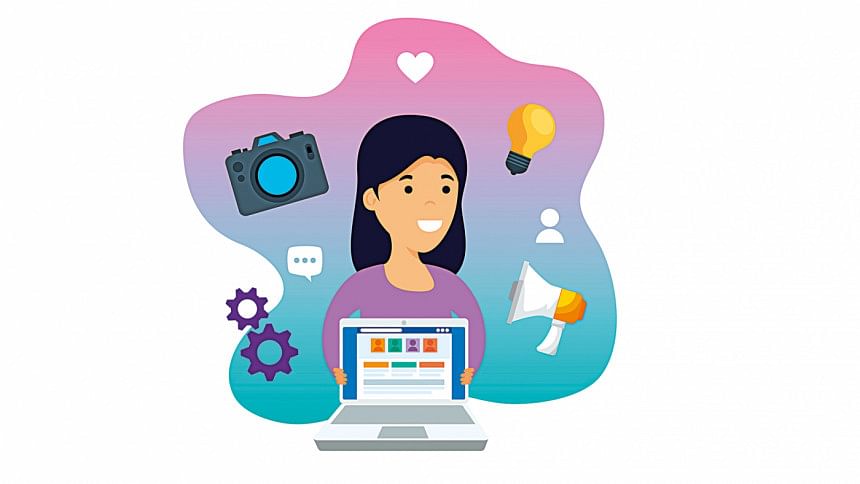Making Digital Services Work for Women in Bangladesh

Bangladesh is charged with a new vision, 'Smart Bangladesh', that seeks to empower its citizens through the widespread implementation of digital literacy programs. This ambitious undertaking reflects the country's rapid digital advancement and remarkable success in digitally transforming all sectors. However, the availability of well-structured digital services for women is still a work in progress, despite noteworthy improvement.
Current Situation
Bangladesh's attempt to bridge the gender gap in the digital sector has not gone unnoticed. Over the years, various digital services, including apps and websites, have been developed to support women in all sectors.
The innovations in digital finance opened the pathways for meeting women's unique financial needs and demands. Some mentionable government digital finance services are 'Sathi', launched by Aspire to Innovate- a2i and 'Swosti', bridging the gap between mobile banking and microloan.
Sathi was launched in 2022 as a part of the government's financial inclusion plan to establish a network for women entrepreneurs. Aside from women-centric financial services, banks have digitised all their services, making them easily accessible for everyone, regardless of gender. Even so, the number of women subscribers in online banking remains very low, as shared by a woman banker who chose to remain anonymous. Women seem to be more reluctant to use online services.
In the case of the government's emergency helpline 999, data shows that only 19% of the calls received are from females. Even then, 41% of the calls come from Dhaka, whereas the females of the less-developed cities or rural areas scarcely reach out for help. Other security apps are available for women to pursue, including Bachao, Daak tracker, Avoy etc.
The health sector has seen some development in the digital front as well. In 2020, Shakti Foundation installed new technology in Shakti Medical Care Centers in collaboration with Digital Healthcare Solutions. There are women-focused apps such as Maya Apa, Bangladesh's first-ever one-touch help service app for women. The Women Support Initiative Forum (WSIF) is an online platform run by women who have been offering various psychosocial services since 2018.
Challenges
Experts have noticed that women's participation in digital services is significantly lower than that of men. One of the main reasons for this kind of behavior is the lack of proficiency in technological devices. Along with that comes the lack of affordability. Being excluded from digital knowledge creates inertia among women users, according to a woman banker. She further adds, "Some [women] have the perception that they have to go through a lot of procedures if they avail banking services. Women are less interested in business formalisation even though they can easily avail of any business-related support online."
Achia Nila, founder and CEO of Women In Digital, emphasises the lack of information among women users.
While availing of security helplines such as 999, women tend to be more comfortable sharing their problems with female police. Although 85% of the 999 call receivers are female police officers, the workforce is still small to tackle the demands. DIG Amena Begum believes they are not being able to offer their expected service due to a lack of adequate human resources. "Women are not aware of the services, especially in the rural areas. Moreover, many may still doubt whether the police will be able to help them," adds Amena Begum while sharing the challenges of providing digital services.
She further shares, "Another major challenge is the lack of policies against cybercrime. As a result, when there is a complaint of digital abuse, the process is delayed as there is no clear understanding of the steps to be followed." However, an online module on Gender Sensitive Policing has recently been generated to educate police officers on operation levels. Amena Begum thinks this attempt will help to improve the workforce and enable them to provide better service.
Opportunities
The blessings of digitalisation are ample, and the opportunities are endless. Gender equality is one of the fundamental factors to be considered here, and the progress in the context of Bangladesh is visible. The availability of digital services for women is commendable. But only developing services is not enough; they require proper monitoring.
According to Farhana A Rahman, Senior Vice President at BASIS, the initial stage of development has been completed, and now is the time to take quality measures to ensure proper service.
She also highlights the importance of awareness building among women users. "Media can play a key role in shedding light on the importance of digital services as well as attract the private and government sectors to prioritise this sector," she says.
Farhana further emphasises building leadership among women so they can ask for themselves. She believes women should be given a sense of responsibility which can start from a very young age by incorporating such concepts in textbooks. If they are aware of what they need, women will be able to demand accordingly. Otherwise, digital services will continue to be built on assumptions creating more gaps.
Sarah Shakhawat is a journalist at The Daily Star.

 For all latest news, follow The Daily Star's Google News channel.
For all latest news, follow The Daily Star's Google News channel. 



Comments